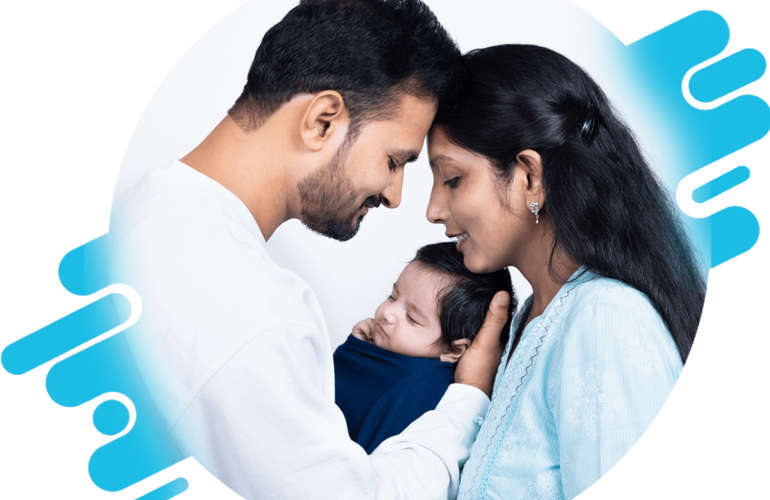What is IVF?
In Vitro Fertilization (IVF) is a complex medical procedure designed to help individuals and couples struggling with infertility to conceive a child. The term “in vitro” refers to the process taking place outside the body, as fertilization occurs in a laboratory dish rather than within the fallopian tubes. This method involves the extraction of eggs from the ovaries, their fertilization with sperm, and subsequent implantation of the embryo into the uterus.
Who Is A Good Candidate For IVF?
IVF is typically recommended for individuals or couples facing fertility challenges that cannot be resolved through simpler treatments. Good candidates for IVF include those with:
- Fallopian Tube Issues: Individuals with blocked or damaged fallopian tubes, which hinder natural fertilization and embryo transportation.
- Male Infertility: Couples with male partners who have low sperm count or poor sperm motility can benefit from IVF by using intracytoplasmic sperm injection (ICSI), where a single sperm is directly injected into an egg.
- Unexplained Infertility: When the cause of infertility cannot be determined through traditional diagnostic methods, IVF can offer a chance at conception.
- Ovulation Disorders: Women with irregular ovulation patterns or conditions like polycystic ovary syndrome (PCOS) can benefit from IVF to regulate the ovulation process.
- Endometriosis: IVF can be a viable option for individuals with endometriosis, a condition where uterine tissue grows outside the uterus.
Who Should Consider IVF?
IVF should be considered by those who have exhausted other fertility treatments without success. It might also be a choice for single individuals or same-sex couples who wish to have a biological child. Additionally, women with certain medical conditions that make pregnancy risky might opt for IVF to undergo preimplantation genetic testing (PGT) to ensure healthier embryos are selected for implantation.
Who Is Not A Suitable Candidate For IVF?
While IVF offers hope to many, it might not be suitable for everyone. Individuals with certain medical conditions that make a pregnancy high-risk, such as severe heart disease or certain cancers, might not be advised to undergo IVF. Additionally, individuals who do not have viable eggs or sperm might need to explore alternatives like using donor eggs, sperm, or considering adoption.
How IVF is done?
The IVF procedure step by step:
- Ovarian Stimulation: Fertility medications are administered to stimulate the ovaries to produce multiple eggs rather than the usual single egg in a natural cycle. Regular monitoring through ultrasounds and blood tests is conducted during this phase.
- Egg Retrieval: Once the eggs are mature, a minor surgical procedure is performed to retrieve them. This is typically done under sedation and ultrasound guidance.
- Sperm Collection: A sperm sample is collected, and high-quality sperm are selected for fertilization.
- Fertilization: In a laboratory dish, the eggs and sperm are combined. In some cases, ICSI may be used to inject a sperm directly into an egg.
- Embryo Culture: Fertilized eggs are monitored and cultured for a few days to allow them to develop into embryos.
- Embryo Transfer: One or more healthy embryos are selected and transferred into the uterus using a thin catheter. Any remaining viable embryos can be frozen for future use.
- Pregnancy Test: A couple of weeks after the embryo transfer, a pregnancy test is conducted to determine if the procedure was successful.
IVF Success Rates in Delhi:
In Delhi, as in other parts of the world, IVF success rates vary based on a multitude of factors. These factors include the age of the woman undergoing treatment, the cause of infertility, the quality of eggs and sperm, and the expertise of the fertility clinic. On average, the success rate of IVF in Delhi ranges from around 40% for women under 35 to about 10-15% for women over 40. It’s important to note that these figures are approximate and can fluctuate from one clinic to another.
How Much Does IVF Cost in Delhi?
The cost of IVF in Delhi can vary significantly based on the clinic’s reputation, location, facilities, and the specific treatments required. On average, the cost of a single IVF cycle in Delhi can range from INR 1,00,000 to INR 2,50,000 or even more. This cost typically covers procedures such as ovarian stimulation, egg retrieval, sperm collection, fertilization, embryo culture, and embryo transfer. Additional expenses may include medications, diagnostic tests, and any potential supplementary procedures. It’s essential for individuals or couples considering IVF to consult with clinics directly to get a comprehensive cost estimate tailored to their needs.
Advantages of IVF:
IVF offers several advantages to individuals and couples struggling with infertility:
- Increased Pregnancy Chances: IVF can significantly enhance the chances of pregnancy, especially for those facing complex fertility issues that cannot be resolved through other methods.
- Genetic Testing: Preimplantation Genetic Testing (PGT) can be conducted during IVF, allowing for the selection of genetically healthy embryos, and reducing the risk of certain genetic disorders.
- Single Parenthood and Same-Sex Couples: IVF enables single individuals and same-sex couples to have biological children by using donor eggs, sperm, or surrogates.
- Fertility Preservation: IVF can be used to freeze and store embryos or eggs for future use, preserving fertility in cases of medical treatments that might affect fertility.
Risks of IVF:
While IVF has brought hope to countless individuals, there are potential risks associated with the procedure:
- Multiple Pregnancies: IVF can lead to multiple pregnancies, increasing the risk of complications for both the mother and the babies.
- Ovarian Hyperstimulation Syndrome (OHSS): The medications used to stimulate egg production can cause the ovaries to swell and lead to OHSS, a potentially serious condition.
- Ectopic Pregnancy: IVF slightly increases the risk of ectopic pregnancies, where the embryo implants outside the uterus, often in the fallopian tubes.
- Emotional and Financial Stress: IVF can be emotionally and financially taxing, especially if multiple cycles are required for success.
Is IVF Painful?
The IVF process involves several steps, some of which might cause discomfort. Ovarian stimulation might lead to bloating and mild discomfort, and the egg retrieval procedure is performed under sedation, minimizing pain. Some individuals might experience cramping or spotting after the embryo transfer. However, pain tolerance varies, and clinics strive to make the process as comfortable as possible.
Is IVF Safe?
IVF is generally considered safe, especially when conducted by experienced and reputable fertility clinics. The medications used for ovarian stimulation might have side effects, and there are risks associated with any medical procedure. However, serious complications are rare. Fertility specialists carefully monitor patients throughout the process to minimize risks and maximize safety.
Conclusion
IVF offers a ray of hope to those struggling with infertility. It’s a multi-stage procedure that can greatly increase the chances of conception for individuals and couples facing various fertility challenges. IVF in Delhi offers promising success rates and a range of advantages for those facing fertility challenges. However, it’s crucial to thoroughly research clinics, consider costs, and consult with medical professionals to make informed decisions regarding this complex but potentially rewarding procedure.
F.A.Q
Q: Should I do IVF or keep trying?
A: The decision to pursue IVF or continue trying naturally depends on individual circumstances. IVF is recommended for those facing fertility challenges that other methods haven’t resolved. Consulting a fertility specialist can help determine the best path forward.
Q: Is it really necessary to have IVF?
A: IVF becomes necessary when other fertility treatments have been unsuccessful or when there are specific medical conditions hindering natural conception. It offers hope to those with complex fertility issues.
Q: Why not go for IVF?
A: IVF might not be suitable for everyone due to its cost, potential emotional strain, and medical considerations. Some might prefer exploring less invasive options before pursuing IVF.
Q: Do IVF babies look like their parents?
A: Yes, IVF babies inherit their genetic traits from their biological parents just like naturally conceived children. IVF only assists with conception; genetics determine physical characteristics.
Q: Is IVF better than natural?
A: IVF is a valuable option for individuals or couples struggling with infertility. However, whether it’s “better” depends on individual circumstances. IVF offers hope when natural conception is challenging, but it’s a personal decision.
Q: What is the alternative to IVF?
A: Depending on the cause of infertility, alternatives to IVF include fertility medications, intrauterine insemination (IUI), lifestyle changes, and adoption. The choice depends on the specific situation.
Q: Is IVF more risky?
A: Like any medical procedure, IVF carries certain risks, including ovarian hyperstimulation syndrome and multiple pregnancies. However, with proper medical guidance, these risks can be managed and minimized.
Q: What is the biggest problem with IVF?
A: Cost is often cited as a significant challenge with IVF. The procedure can be expensive, and multiple cycles might be required for success. Emotional and psychological stress can also be challenging.
Q: Is IVF harmful in the long term?
A: Current research suggests that IVF does not pose significant long-term health risks for children conceived through the procedure. However, long-term studies are ongoing, and it’s important to stay updated on medical advancements.



